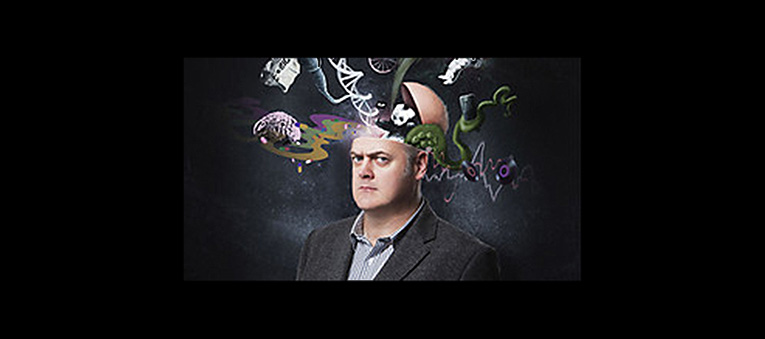UCC Scientists featured in "Invisible Worlds"

University College Cork scientists feature in, “Invisible Worlds”, the last of the current series of Dara O’Briain’s Science Club at 8pm on BBC2 TV tomorrow, Thursday, 29th August.
One of the key arms of Professor Cryan's research is focused on understanding the interaction between brain and the microbiota within the gut and how it applies to disorders including depression, anxiety, irritable bowel syndrome, obesity and autism. Professor Cryan was recently awarded the prestigious Utrecht University Excellence in Pharmaceutical Research Award and was named UCC Researcher of the Year in 2012. His research group is funded by Science Foundation Ireland, the Health Research Board, The Irish Research Council and the European Union Seventh Framework Programme.
Professor O’Toole’s research aims to understand bacterial associations with the human gut, and how this impacts on health and disease. Professor O’Toole led the Eldermet study which found that the composition of the gut microbiota can positively and negatively impact the health of older people in our population (see Nature July 2012). He was able to apply these methods to determine the composition of Alok Jha’s microbiota, and how that reflected what his normal diet is.
The Alimentary Pharmabiotic Centre is a national centre for food and medicine which recently received €50m funding from government and industry through Science Foundation Ireland’s Research Centres programme. The APC spans across UCC, Teagasc (Ireland's Agriculture & Food Development Authority) and Cork Institute of Technology. APC’s research explores how bacteria in the human gut impacts on population health, leading to the development of future foods and medicines.
One of the key arms of Professor Cryan's research is focused on understanding the interaction between brain and the microbiota within the gut and how it applies to disorders including depression, anxiety, irritable bowel syndrome, obesity and autism. Professor Cryan was recently awarded the prestigious Utrecht University Excellence in Pharmaceutical Research Award and was named UCC Researcher of the Year in 2012. His research group is funded by Science Foundation Ireland, the Health Research Board, The Irish Research Council and the European Union Seventh Framework Programme.
Professor O’Toole’s research aims to understand bacterial associations with the human gut, and how this impacts on health and disease. Professor O’Toole led the Eldermet study which found that the composition of the gut microbiota can positively and negatively impact the health of older people in our population (see Nature July 2012). He was able to apply these methods to determine the composition of Alok Jha’s microbiota, and how that reflected what his normal diet is.
The Alimentary Pharmabiotic Centre is a national centre for food and medicine which recently received €50m funding from government and industry through Science Foundation Ireland’s Research Centres programme. The APC spans across UCC, Teagasc (Ireland's Agriculture & Food Development Authority) and Cork Institute of Technology. APC’s research explores how bacteria in the human gut impacts on population health, leading to the development of future foods and medicines.
Cork NeuroScience CNS Centre - Integrating Clinical and Basic Research
Contact us
Cork NeuroScien floor,
